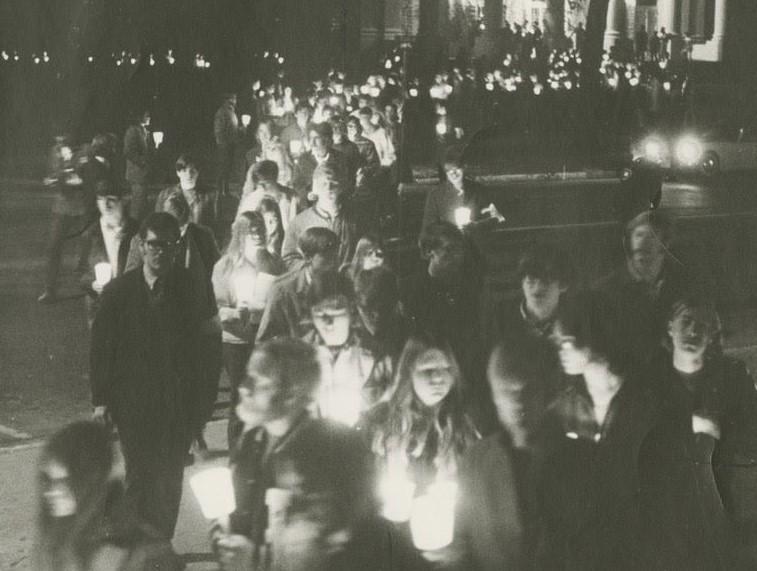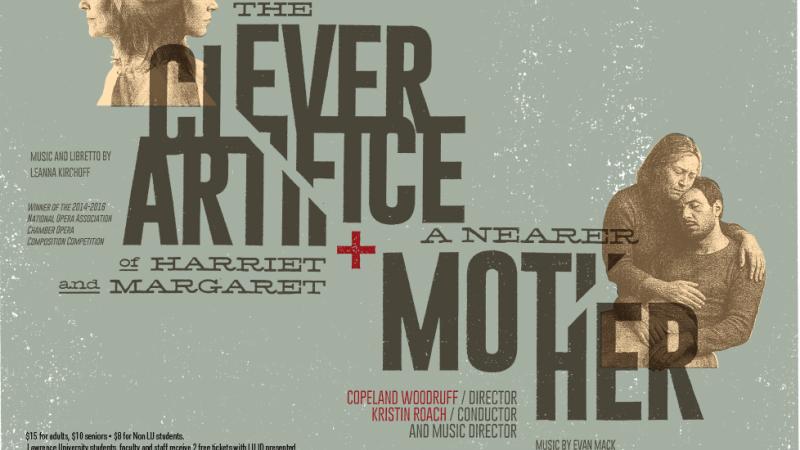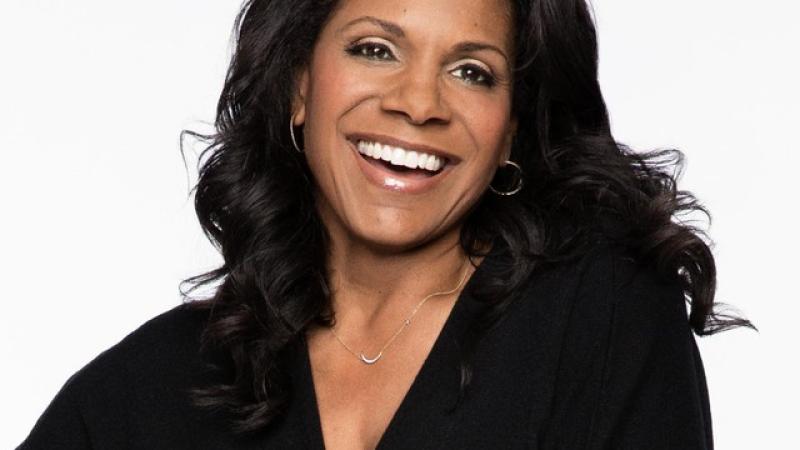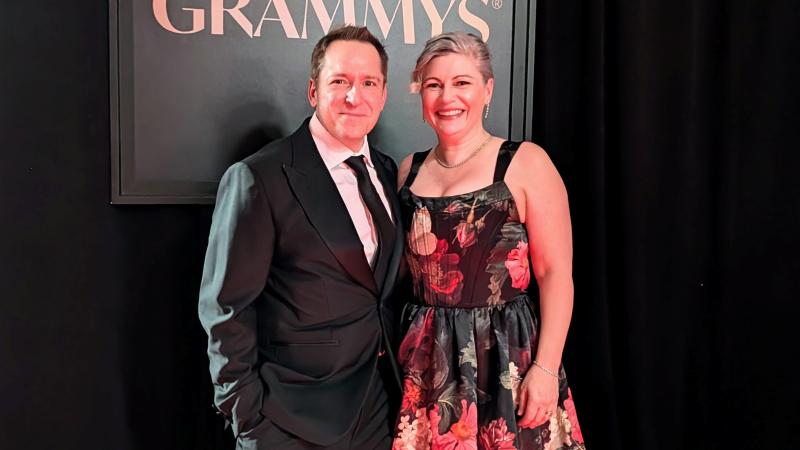Graduating from college when it feels like the world is on fire isn’t a particularly comforting thing. Members of Lawrence University’s Class of 1970 can tell you something about that.
Fifty years after walking across the Commencement stage on Main Hall Green at an event that felt part celebration, part protest, part chaos, the Lawrentians of that class have nothing but words of encouragement for the 2020 graduates who are navigating their own moment of chaos.
Margaret Everist ’70 was one of those graduates 50 years ago. She feels the disappointment and pain of this year’s graduates, who had to finish their final term away from campus and watched the job market implode amid the COVID-19 pandemic. Her advice? Stay focused on what’s in front of you — the opportunity to change the world.
“That’s really what it’s all about,” Everist said from Minneapolis, where she retired after carving out successful careers in health care and finance. “Go out into the world to make a difference, one small step at a time.”
Lawrence held a virtual 2020 Commencement on Sunday, honoring nearly 270 graduates. As the day arrived, racial injustice protests rolled across the country, a tipping point that is resetting public conversations on equality, inclusion, and police brutality. Combined with the ongoing pandemic, it added new context to Commencement and the graduates’ post-Lawrence journeys: “As we continue to settle into this uncertainty, maybe a little more uncertainty than we might’ve bargained for four years ago, I am confident that if any class has the strength to deal with the weight of the world, it’s the Class of 2020,” senior class speaker Samantha Lizbeth Torres ’20 told her classmates.
We feel your pain
The Class of 1970, meanwhile, was supposed to be on campus this week to celebrate its 50th anniversary, but, alas, Reunion fell victim to the coronavirus lockdown. The class that graduated amid a firestorm of anti-war protests following the U.S. invasion of Cambodia and the subsequent shootings of student protesters on the campuses of Kent State and Jackson State put plans to gather in person on pause. Instead, a virtual “re-Commencement” was held Sunday to bring the class together online. More than 100 members of the class took part.
For members of that class, the emotions of Commencement 50 years ago still linger. The ceremony took place but the divisiveness was palpable, the graduates recall. Many refused to wear their caps and gowns. Some wore black armbands. The Commencement speaker lectured the students, calling their generation self-absorbed, naïve, and humorless.
“The Vietnam War was raging and draft boards were aggressively seeking out young men whose service had been deferred during college,” Bill Hillburg ’70 recalled. “Baby boom demographics resulted in too many new grads chasing too few jobs and professional school slots. Inflation was devouring salaries. We were collectively freaking out.”
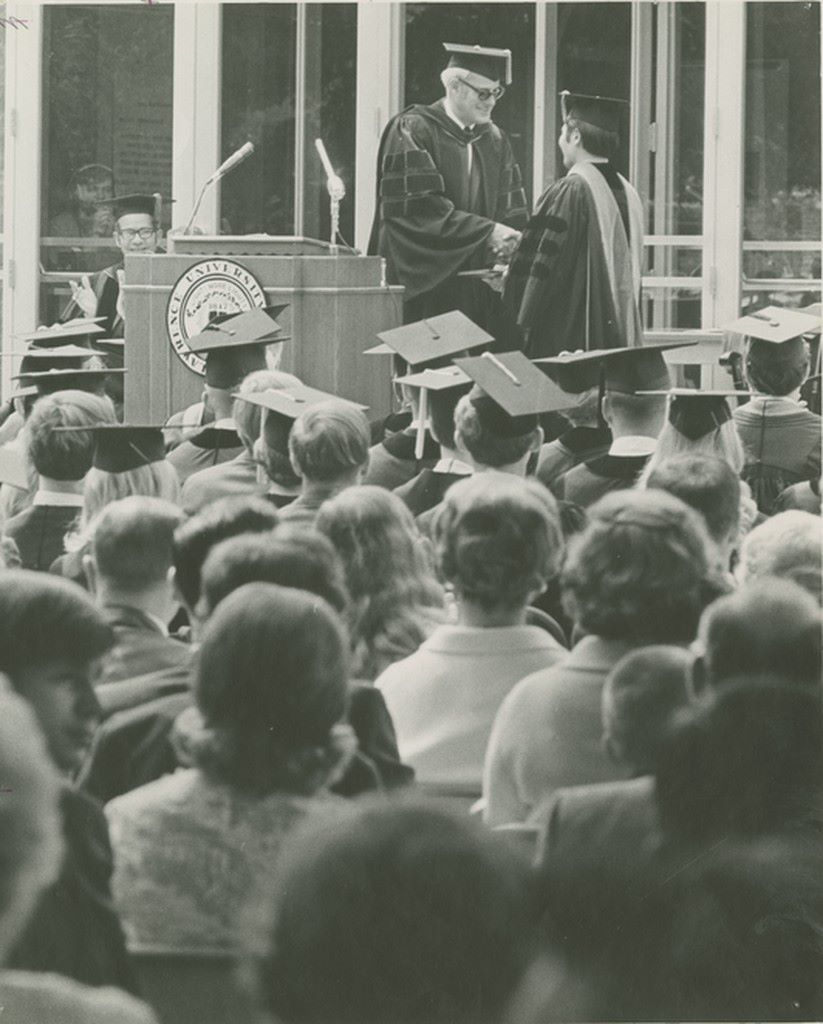
The 1970 Commencement went on as scheduled despite anti-war protests that had heated up in the weeks following shootings at Kent State and Jackson State. “It was a divisive mess,” Myra Krinke Hillburg ’70 said. The class, marking its 50th anniversary, held a virtual “Re-Commencement” on Sunday. (Lawrence University photo)
It was in the weeks leading up to Commencement that the bottom seemed to fall out. College campuses were already hotbeds for anti-war protests, and then on May 4, 1970, the improbable happened. Ohio National Guard troops opened fire on students on the Kent State campus, leaving four dead. Less than two weeks later, police fired shots on the campus of Jackson State, killing two students.
Protests would escalate on campuses across the country.
In Appleton, hundreds of protesters, many of them Lawrence students and faculty, flooded into the downtown the day following the Kent State shooting, the anger reflected on the front page of a special edition of The Lawrentian. Classes on campus would be temporarily suspended as the protests continued through the remainder of the term.
“Our college years were anything but perfect,” said Myra Krinke Hillburg ’70. “We were on the streets protesting the war and the racial and gender inequalities we could witness every day. Our country was as divided then as it is now.”
For her and her classmates, college had been tumultuous from the start. They saw the assassination of the Rev. Martin Luther King Jr., then Robert F. Kennedy. The Vietnam War was escalating and emotions were running raw.
“We finished out our senior year with suspended classes and bitter divides among the Lawrence administration, faculty, and student body,” Krinke Hillburg said. “Yes, we had a graduation ceremony, but it was a divisive mess, with many students wearing black armbands and donating the money that would have gone to cap and gown rental to the anti-war effort. Our Commencement address was given by a faculty member who chastised us for our naivete and privilege. Our idealism was ridiculed, our upheaval of cherished Lawrence traditions mourned. We were the least favorite graduating class of all time.”
A message of hope
For Bill Hillburg, it was a Lawrence staff member, a career adviser, who provided a sense of calm and hope amid all the chaos. You have a Lawrence education to cling to, and that is no small thing, he told students who had gathered for a spring term counseling session.
“He had no hot job tips or secrets for getting into grad school, which was not an option for the draft eligible,” Bill Hillburg said. “He also didn’t advise us whether to take up arms or flee to Canada. But he did give us hope. He assured us that our lives and careers would take us on paths we could not foresee and adventures and challenges we could not imagine, and through it all, we would benefit from being educated Lawrence grads. He was right.”
Bill and Myra would marry shortly after leaving Lawrence. Bill would go on to work many years as a journalist, mostly in California, and later with the U.S. Department of Homeland Security. Myra would become an accomplished teacher and girls’ golf coach.
“Along the way, we lived in several states and foreign countries and raised two talented daughters,” Bill Hillburg said.
John Fease ’70, a retired pastor who provided the benediction at Sunday’s “Re-Commencement,” said a lifetime of experiences has dulled the frustrations that surrounded Commencement. He, in fact, didn’t even graduate as expected that spring. He was short on credits, which pushed his Commencement to the following year. While his classmates went through with a fractious Commencement ceremony, he and his fiancee, Barb, got married.
So, as Fease and others on the 1970 Reunion Committee were meeting over the last year to plan their 50th reunion, he and Barb also were looking forward to marking their 50th wedding anniversary the same weekend. That celebration is not canceled.
“While there is great disappointment that we won’t be gathering for the reunion this year, Barb and I plan to shelter together to celebrate our 50th anniversary,” Fease said. “Surely, reason to rejoice.”
Fease, Everist, the Hillburgs, and their classmates are now delivering to the Class of 2020 a message of resilience: There are lifelong benefits to having a liberal arts education, and, thus, the uncertainty of the moment will give way to new opportunities and adventures. Krinke Hillburg said there’s much to be disheartened about right now, from the state of today’s politics to “the deterioration of our planet, another unending war, and unprecedented inequality in our society.” But just as it was true 50 years ago, today’s graduates have much to build on.
“Without our Lawrence education to see us through life, we could be inconsolable,” she said. “But the light of intellectual curiosity and the quest for knowledge Lawrence provided us with has seen us through many of life’s dark moments.”
For Everist, it was the ongoing connections with fellow Lawrentians that helped guide her journey once she left Appleton. Today’s graduates will feel the same, even if they fell separated at the moment, she said.
“It’s not the end,” Everist said of Commencement. “It’s the end of being at Lawrence, but it’s not the end of the Lawrence experience.”
